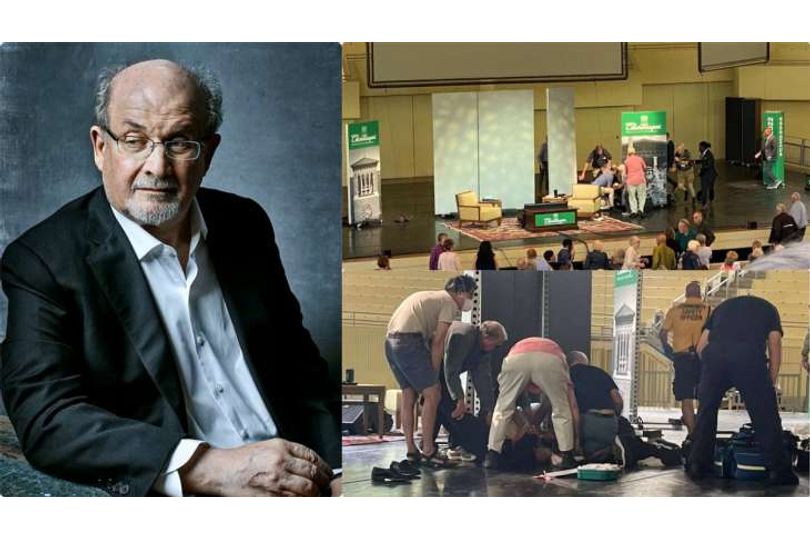Authors express concern about Indian democracy in response to the Salman Rushdie attack
on Aug 17, 2022

Over 100 authors, including Salman Rushdie, who is recovering from an assassination attempt in New York last week, have expressed concern about India's democracy as it celebrates 75 years of independence, lamenting that "a shadow lies upon the country we loved so deeply."
The short statements by 113 Indian and Indian-origin authors, titled "India at 75," were gathered over time by the US-based free speech watchdog PEN America and posted on its website on Monday.
On Independence Day, 102 writers and PEN supporters from around the world wrote to President Droupadi Murmu, urging her to protect the freedom to write in India.
Prior to the attack, Rushdie contributed to both efforts. The short texts of Mehta, Rushdie, and Rajmohan Gandhi, historian and Mahatma Gandhi's grandson, are reproduced at the start of this report.
Rushdie's The Satanic Verses was first banned in India in 1988, and the author has faced opposition from public officials and Islamist groups to visit the country. Rushdie, who was born in Bombay, last visited India in 2013.
The introduction by PEN to the messages from 113 authors, including Kiran Desai, Jhumpa Lahiri, Geetanjali Shree, Ganesh Devy, Priyamvada Gopal, Shobhaa De, Ashok Vajpeyi, and Mehta, referred to free India's retention of draconian colonial laws and the 1975 Emergency.
"However, the 2014 election has transformed India into a country where hate speech is expressed and disseminated loudly; where Muslims are discriminated against and lynched, their homes and mosques bulldozed, and their livelihoods destroyed; where Christians are beaten and churches attacked; and where political prisoners are held in jail without trial," it continued. Permission to leave the country is denied to dissenting journalists and authors."
"The institutions that can defend India's freedoms — its courts, parliament and civil service, and much of the media — have been co-opted or weakened," according to the PEN introduction. According to the most recent Freedom to Write Index from PEN America, India is the only nominally democratic country among the top ten jailers of writers and public intellectuals worldwide. In recent years, India has seen an increase in threats to free speech, academic freedom, and digital rights, as well as an increase in online trolling and harassment.
According to the PEN introduction, "the institutions that can defend India's freedoms — its courts, parliament, civil service, and much of the media — have been co-opted or weakened." According to PEN America's most recent Freedom to Write Index, India is the only nominally democratic country among the top ten global jailers of writers and public intellectuals. Threats to free speech, academic freedom, and digital rights have increased in recent years in India, as has online trolling and harassment.
"Authors from all over the world, as well as authors from India's many languages, communities, faiths, and castes, sent us their thoughts." Some are optimistic, some are praying, and some are anguished and enraged. Some imply defeat, while others express hope, and still others are defiant. The authors represent a range of political perspectives and may disagree on many other issues, but they are united in their concern for the state of Indian democracy."
"The plurilingual aspect of India, in particular, both inspired and consoled me, because it insisted on the need for ongoing communication and translation," wrote Pulitzer Prize winner Lahiri. The coexistence of multiple languages arouses curiosity, necessitates interpretation, and challenges any notion of absolute power. If certain threads are unravelled or strands are severed, the conversation is lost; we are left with a frayed society, imposed silence, and banal and baleful notions of nationhood."
Desai composed eight haikus in memory of an eight-year-old girl who was raped in a temple in Kathua, Jammu, in 2018. According to one of the poems:
“As if a girl is what it takes to rape and kill it takes a village
It takes a policeman a temple custodian a tax man, a son
Who took the bus all the way from Meerut because it takes a village.
The signatories, who included J.M. Coetzee and Orhan Pamuk, wrote to President Murmu, saying they "are writing to express our grave concerns about the rapidly deteriorating situation for human rights in India, particularly freedom of expression and creative expression, on the eve of India's 75th anniversary of independence."
"We write to express our grave concern about the myriad threats to free expression and other core rights that have been steadily building in recent years, since the Bharatiya Janata Party-led government came to power," it continued.
"Authorities and private actors both use legal action and the threat of legal action against people who express dissenting views, independent thought, and human rights advocacy on a regular basis." Writers and public intellectuals are subject to arrest, prosecution, and travel bans intended to restrain their free speech. Online trolling and harassment is rife, hate speech is expressed loudly, and internet shutdowns centred on Kashmir limit access to news and information for a significant number of people.”
The unpunished murders of rationalists Govind Pansare, Narendra Dabholkar, and M.M. Kalburgi, as well as journalist Gauri Lankesh, are mentioned in the letter, as is the arrest of seven writers in the Elgaar Parishad-Maoist links case, and the State persecution of journalists Mohammed Zubair, Siddique Kappan, Teesta Setalvad, Fahad Shah, Rana Ayyub and Aatish



.jpg)






.jpg)

.jpg)
.jpg)
.jpg)
.jpg)
.jpg)
.jpg)










Sorry! No comment found for this post.